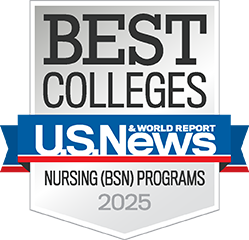BSN students earn kudos for CPR skills



Curiosity, confidence, and practice created opportunities for two Cizik School of Nursing at UTHealth Houston students to impress their preceptors recently by demonstrating cardiopulmonary resuscitation (CPR) skills during clinical rotations.
Omar Tabbara and Hadia Khan both credit refresher sessions in Associate Professor Sandra Branson’s community health nursing class for preparing them to step up when CPR is needed, whether in a health care setting or in the community.
“It just goes to show that we all need to continuously train,” said Branson, PhD, MSN, RN, CNE, who makes sure to maintain her own first responder skills and qualification.
The circumstances surrounding Tabbara’s and Khan’s first CPR experiences began almost identically. They heard codes being called in the ICUs where they were completing clinical rotations and went to investigate, hoping to observe and learn. In both cases, a nurse on duty asked if they were students, and offered them the chance to perform compressions.
“It was kind of like controlled chaos,” Khan said, describing the activities inside her patients’ room. “Everyone has a role, and you stick to that role.”
CPR can be physically taxing, so those performing it take turns, switching out the compressor role after two minutes. In Tabbara’s case, he jumped in after the first pulse check and recalls the charge nurse grabbing his shoulders, looking him in the eye, and asking, “Any questions?” before he started.
The nurses in the room supported him, cheered him on, and reminded him to sing the song “Staying Alive” to maintain the proper rhythm.
“The patient returned to spontaneous circulation and had a pulse,” Tabbara said. “It is a really heart-happy feeling when you are able to bring someone back.” Tabbara cared for the surviving patient in subsequent rotations in the ICU.
Khan learned somewhat different lessons from her CPR experiences. Her first chance to perform compressions came during her very first rotation. She took three turns and quickly learned that because of her small frame, climbing onto the bed to perform CPR worked better than standing at the bedside. A pulse returned after her third set of compressions, but the patient coded again and did not survive.
“Things like this happen,” said Kahn, adding that the experience taught her the value of discussing wishes with family members, including whether to have do-not-resuscitate documents in place. “You have to accept that you can’t save everyone. You must do what’s best for the patients and the families.”
Basic life saving (BLS) courses are required every two years for certification renewal, but both students agree that more frequent practice is needed.
“The research shows strong evidence that significant deterioration in skills occurs within a two-year timeframe, so it is essential that health care workers practice CPR to be confident and effective responders if CPR is needed,” Branson said. “CPR, when performed effectively, can double a person’s chance of survival, and the data shows we should practice at least every six months because we get rusty.”
“You don’t have time to pause and think when someone’s life is on the line,” Khan said.
Branson, who is passionate about repetitive BLS training, recently found herself in a situation where she needed an automated external defibrillator (AED) at a restaurant that did not have one. “Early defibrillation is the only definitive treatment for certain dysrhythmias, so the community must strongly advocate placing AEDs in public areas so bystanders can save lives,” Branson said.
During the refreshers in her community health nursing classes, Branson uses an advanced CPR manikin that connects to an app to provide feedback on compression rate, depth, and recoil as well as ventilation and hands-off time.
Tabbara will graduate this spring and has been offered a job in the ICU at the hospital where Branson works. He advises nursing students to have confidence and advocate for themselves when opportunities arise to practice what they learn in school.
“I felt like I could do it, and I took advantage of the opportunity,” Tabbara said. “I will never forget this experience.”
Khan was offered a NICU job where she will continue to practice her critical care skills.
“Make the most of any opportunity that allows you to use your knowledge to benefit others,” Khan advised other student. “Sometimes it’s scary, but you need to remind yourself that you have learned all of this and now is your chance to use it.”


